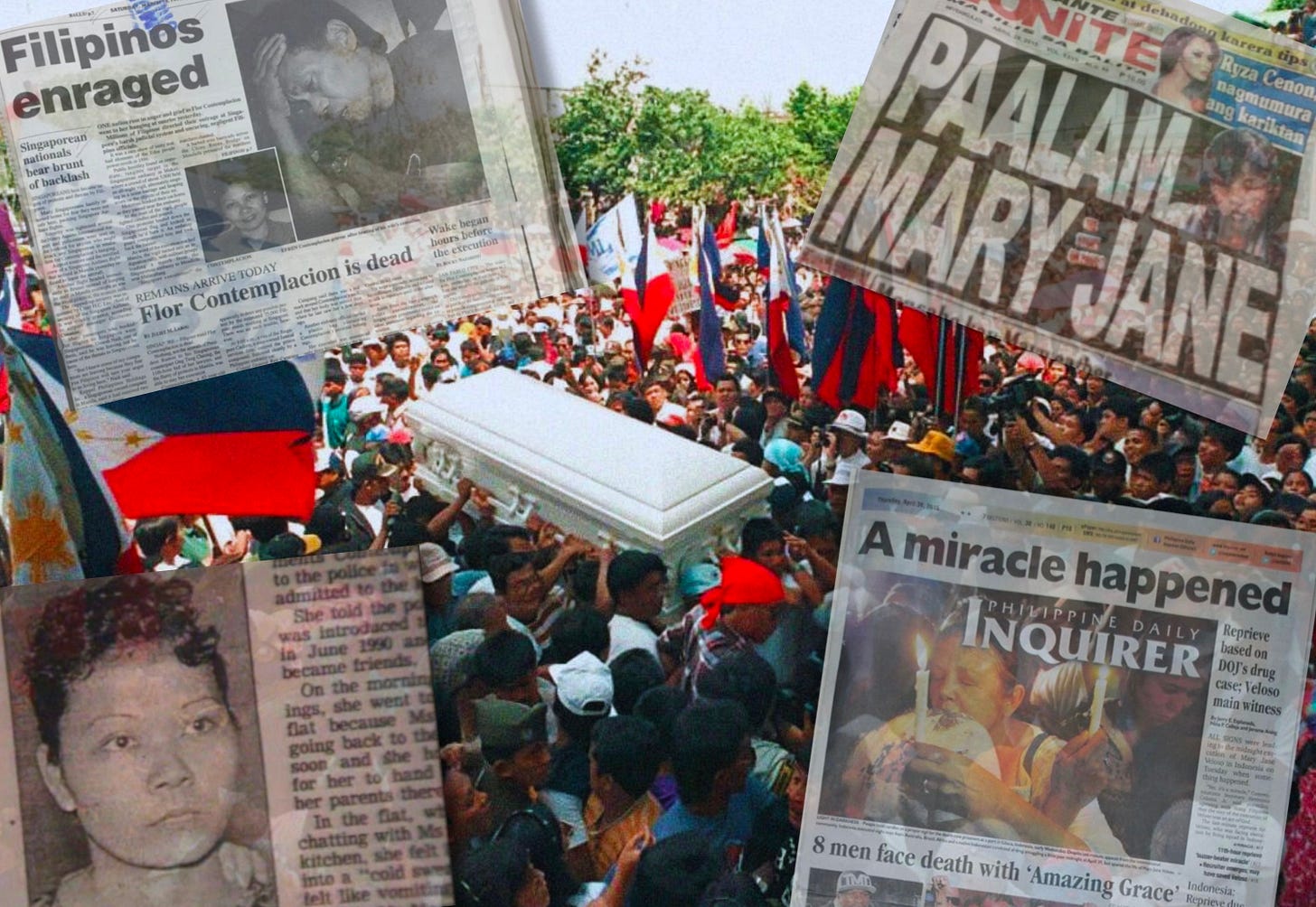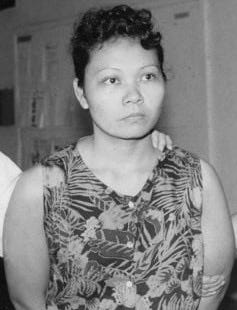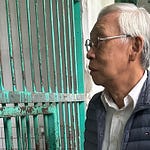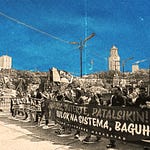Two Filipino women in two different countries, two decades apart, both facing the death penalty.
The stories of domestic workers Flor Contemplacion and Mary Jane Veloso, both of whom were sentenced to death, have become ingrained in the Philippine national psyche: one symbolising loss; the other hope.
Their stories continue to resonate widely. Filipino domestic workers who move abroad for years at a time can often find themselves in overwhelming circumstances — fatigued from working long hours with few days off, while suffering culture shocks and sometimes mistreatment, with a lingering homesickness of being separated from their loved ones.
Yet working abroad remains a common practice; for many, it’s the best option to earn a decent wage. Each year, around 172,000 Filipino women leave their home country to work abroad, part of a workforce that contributes to almost 10% of the Philippines’ GDP through remittances.
Flor and Mary Jane’s cases underscore how extreme circumstances can deeply affect Filipinos working abroad, along with their families, friends, and in these particular cases, the legal teams fighting for their lives.
Flor
According to Sister Gerard Fernandez’s account, Flor sang Amazing Grace as she made her way towards the gallows in Singapore’s Changi Prison.
“[Flor] walked peacefully,” says the nun, who served for years as a religious advisor to numerous death row inmates — including during their final hours. “As they walk up to the trap door, I kneel down and I pray as they go up. And then I hear the lever, I know that’s the… that she’s gone.”
Flor had moved to Singapore in 1988, where she found work as a domestic worker. She was arrested in 1991 for the murders of fellow domestic worker 34-year-old Delia Mamaril Maga, and Nicholas Huang, a three-year-old boy in Maga’s care. After two days in custody, Flor confessed to the murders, for which she was convicted and sentenced to death (a sentence later upheld up on appeal).
One of the lawyers who began working on her case in 1995 was Edre Olalia. Now a well-established human rights lawyer and anti-death penalty campaigner, Edre was, at the time, a relatively junior lawyer who was sent to Singapore at the last minute. “We were racing against time, and then somebody has to fly post-haste to Singapore because Flor was about to be hanged,” he says.
“By some happenstance, I was the only one who had my passport ready […] So the head of that law centre said ‘Can you fly and help in this case, and accompany a vital witness that would support our position that Flor was set up, and there was evidence pointing to her innocence?’”
Flor’s legal team claimed that her initial confession, which she later recanted, was made under duress — due to fatigue, and lack of access to legal representation or an interpreter. Many have also questioned the validity of the evidence against Flor, citing an absence of forensic evidence linking her to the murder, along with allegations of mistreatment while she was in custody. (However, it’s worth noting that Singaporean authorities pushed back heavily on allegations on improper conduct, and in her interview with The Singapore Academy of Law in 2019, Sister Gerard says that during their conversations in the weeks leading up to Flor’s execution, Flor confessed to the murders: “I think I’m the only that has the, shall I say, the real details,” Sister Gerard says. “In the end, she did admit what she had done.”)
The case and its various legal challenges began making international headlines. Flor soon became a household name in the Philippines, sparking widespread outrage over her sentencing. Some saw her death sentence as the brutal treatment of a woman from a poor background who had struggled in a foreign country, undeserving of such a fate; others were convinced an innocent woman had been condemned to die at the hands of a foreign state.
“The popular sentiment was overwhelming,” says Edre. “People were holding vigils all over the Philippines, lighting up candles in their houses, all over the country. They don’t know who Flor Contemplacion is, but they were really commiserating with her because the facts that were out showed that there was really doubt as to her guilt.”
Despite their efforts, and huge amounts of support from Filipinos both at home and abroad, Flor was hanged on March 17, 1995. She was 42 years old.
When her body was repatriated to the Philippines, thousands of people took to the streets to mourn her passing. “There was a massive rally,” says Edre. “She was met at the airport, on the tarmac, and there was a motorcade all the way from Manila airport to her home province which was about two hours away.”
Following her execution, then-Philippine president Fidel Ramos came under heavy criticism for not doing enough to intervene in Flor’s case. This seems to have marked a turning point in the approach by successive governments toward foreign policy on the death penalty, with later administrations becoming far more involved in pushing for the rights or appeals of Filipinos on death row abroad.
Mary Jane
Two decades after Flor was hanged in Singapore, Mary Jane Veloso sat in a prison cell in Nusa Kambangan, an island off the coast of Java in Indonesia where executions are carried out, counting down the moments before she was due to face a firing squad.
Also a former domestic worker from the Philippines, Mary Jane had first travelled from the Philippines to Malaysia in 2010 for work. Shortly after arriving, she was told the job arranged for her in Kuala Lumpur had fallen through — but she was assured that employment had been secured for her in Indonesia. Upon arrival in Yogyakarta airport, she was arrested when 2.6 kilograms of heroin were found stitched into the inner lining of her suitcase.
After a seven-day trial — during which she was represented by a court-appointed lawyer and struggled to understand much of the proceedings — Mary Jane was sentenced to death. At the time Indonesia had a moratorium on executions, but capital punishment would be brought back into effect four years later under the presidency of Joko Widodo.
In the lead-up to her scheduled execution in 2015 — this time with Edre serving as lead lawyer from the Philippines — cross-border legal teams scrambled to save her life. “There were a lot of appeals, online and in person; a lot of rallies in Manila and in Jakarta; a lot of press conferences, and statements, and appeals from different groups — lawyers, migrants, women — all over the world,” he says.
Mary Jane and her lawyers maintained she had no knowledge of the drugs, claiming the suitcase containing them had been given to her by the people who had promised her work in Indonesia. The pressure continued to ramp up, coming from activists and legal teams in Indonesia and the Philippines, and mounting scrutiny from the international community.
“It attracted attention,” Edre adds. “Because she was a woman; she was a single mother; she was a poor domestic helper, who was forced to leave her own country just to put food on the table. And the point that she was a victim of unscrupulous drug traffickers also made a lot of impact and attention globally.”
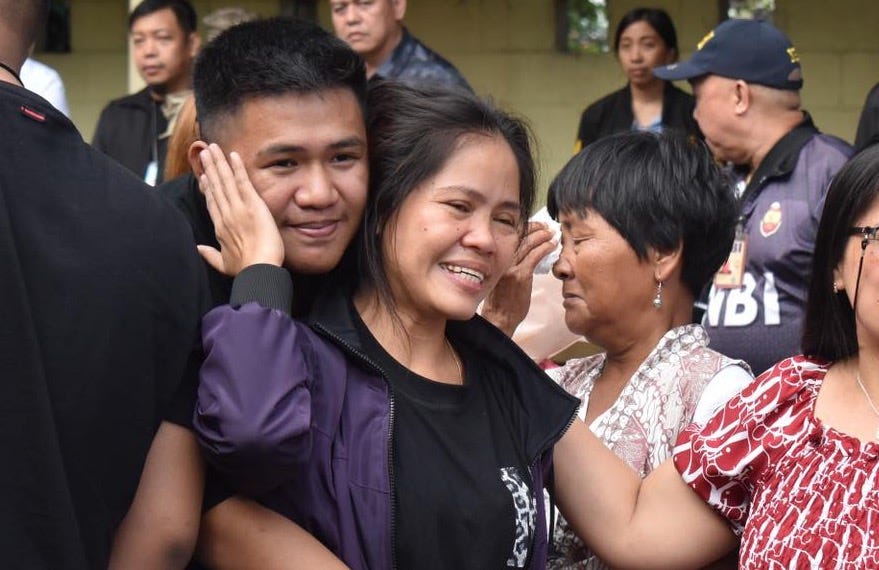
As the hour of her scheduled execution grew closer, Mary Jane said emotional goodbyes to her family. According to Father Charlie Burrows, a priest who counselled prisoners on death row, in what she thought would be their last visit Mary Jane begged for more time with her 12- and six-year-old sons, causing the prison staff to also break into tears. “The warden and attorneys felt real bad about it,” the priest later recounted. “They said to me they didn’t agree with the thing, they just had to do their job, that there should be a moratorium.”
But on the day itself — at almost literally the 11th hour, amidst numerous last minute appeals from legal teams and the Philippine government — Mary Jane was told she’d been spared from the firing squad. Her scheduled execution had been so imminent that newspapers in the Philippines had already gone to print announcing her death, with copies of the Philippine Daily Inquirer carrying the headline ‘Death came before dawn’ on their front page, while tabloid Abante ran with ‘Paalam, Mary Jane’ (paalam meaning ‘goodbye’ or ‘farewell’ in Tagalog).
But other death row prisoners were not so fortunate. Eight men were executed that night, perhaps most famously Andrew Chan and Myuran Sukumaran, two Australian citizens and members of the Bali Nine.
In the years that followed, Mary Jane’s case continued to gain publicity in the Philippines while undergoing legal review in Indonesia, largely due to the combined efforts of lawyers and anti-death penalty activists in both countries. Finally, in December 2024 — at the age of 39, after more than 14 years in prison and nine-and-a-half-years after she was due to die — the Indonesian authorities announced that Mary Jane would be repatriated to the Philippines.
She has since been returned to Manila, with photos of her reunion with her family becoming iconic. But despite no official requirements being made following her release from Indonesian custody, Mary Jane remains incarcerated in her home country. Numerous legal appeals and public petitions have been — and continue to be — filed, urging President Ferdinand ‘Bongbong’ Marcos Jr. to grant her a full release.
In this episode
For this episode of the Currents podcast, I speak with Edre about his experiences with the cases of Flor and Mary Jane.
In addition to his work on cases abroad, Edre has spent more than three decades working prolifically on human rights issues in the Philippines, including cases of enforced disappearances and extrajudicial killings.
This work has exposed him to continued threats and scrutiny — including being ‘red-tagged’, a practice in which individuals are falsely labelled as communists, terrorists, or subversives — which became particularly dangerous during the presidency of Rodrigo Duterte, when the number of targeted killings of judges and lawyers sharply increased.
In our interview, Edre speaks candidly about his experiences with the devastating loss of Flor, and the years-long fight that eventually secured Mary Jane’s reprieve and return home.




